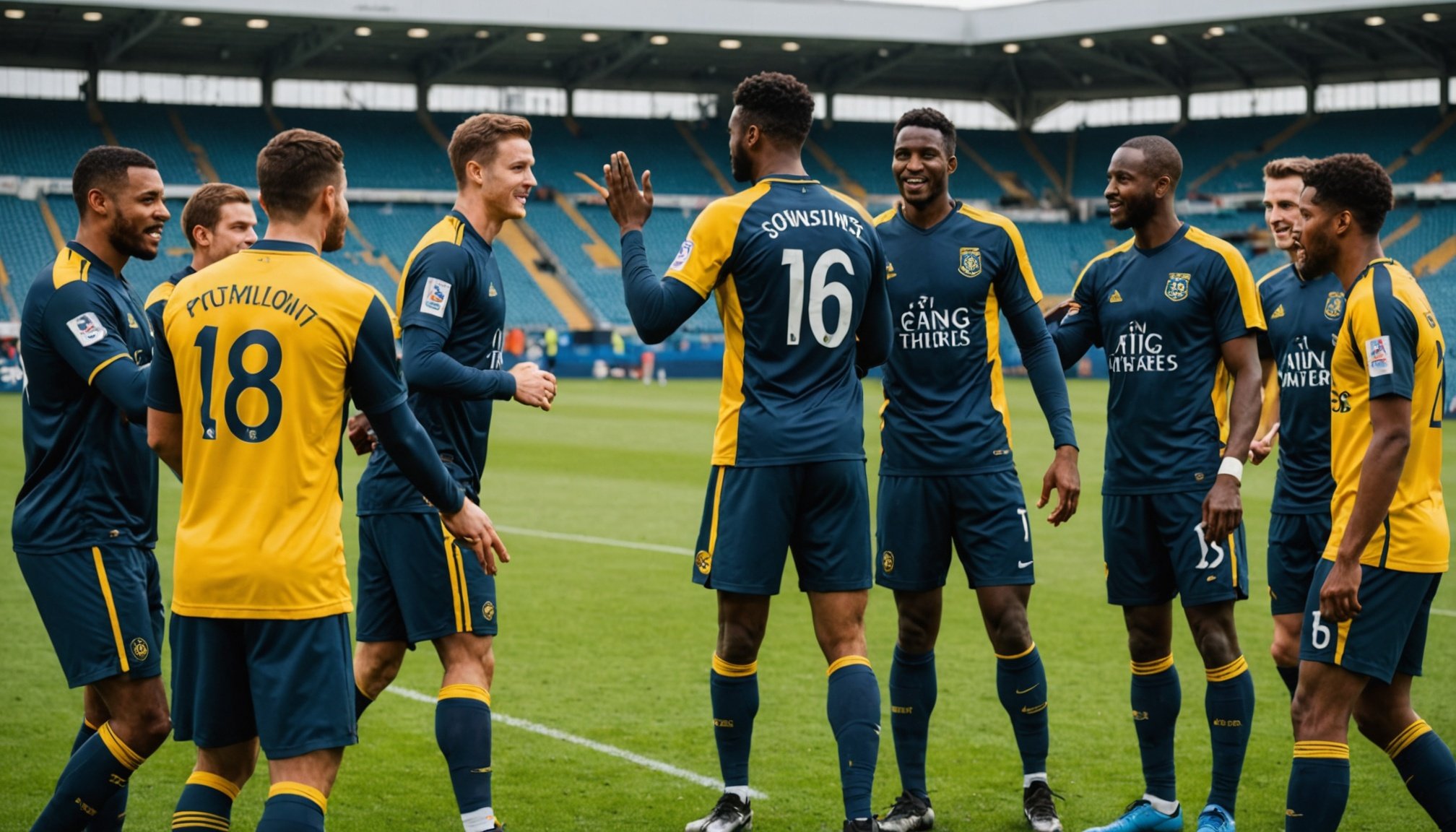Unlocking the Secrets of Effective Multicultural Communication in Football Teams: Proven Strategies for Success
In the vibrant and diverse world of football, effective multicultural communication is not just a nicety, but a necessity for success. As football teams become increasingly global, the ability to communicate across cultural boundaries can make or break a team’s performance. Here, we delve into the strategies, benefits, and real-world examples of how football teams can harness the power of multicultural communication to achieve greatness.
The Importance of Multicultural Communication in Football Teams
Football is a global sport, and modern teams are a melting pot of cultures, nationalities, and backgrounds. Effective communication is the backbone of any successful team, and in a multicultural setting, it becomes even more critical.
Topic to read : Enhancing football performance: discover the unexpected benefits of incorporating yoga into your training regimen
Breaking Down Cultural Barriers
In a multicultural team, players and staff come from different cultural, ethnic, and linguistic backgrounds. This diversity can be a significant strength, but it also presents unique communication challenges. For instance, a coach from one culture may use idioms or expressions that are unfamiliar to players from another culture, leading to misunderstandings and miscommunications.
To overcome these barriers, teams must adopt strategies that foster inclusive and respectful communication. Here are some key approaches:
Also to read : Essential recovery techniques for football players over 30: boost your performance and well-being
-
Diverse Marketing Teams and Staff: Having a diverse coaching staff and support team can provide valuable insights into different cultural nuances. For example, the United Football League (UFL) emphasizes the importance of diverse recruitment and talent development programs to ensure that all individuals feel valued and respected[1].
-
Cultural Sensitivity Training: Regular training sessions can help team members understand and appreciate different cultural practices and communication styles. This can include workshops on cross-cultural communication, cultural awareness, and conflict resolution.
-
Language Support: Providing language support for players who may not be fluent in the dominant language of the team can significantly improve communication. This could include interpreters, language classes, or bilingual staff members.
Strategies for Effective Multicultural Communication
Effective multicultural communication in football teams involves several strategic elements that go beyond mere translation.
Adaptability and Flexibility
Teams must be adaptable and flexible in their communication approaches. Here are some strategies that UFL teams use:
-
Player Roles and Positioning: Assigning specific roles based on players’ strengths requires meticulous planning and coordination. This approach ensures that players are in the right place at the right time, executing the team’s strategy effectively[1].
-
Real-Time Adjustments: Coaches and players must be able to make real-time decisions based on the strengths and weaknesses of their opponents, as well as external factors like weather conditions and venue. This adaptability is crucial in a dynamic and fast-paced sport like football.
Community Engagement and Inclusivity
Engaging with the community and promoting inclusivity are key to building a strong, cohesive team.
-
Fan Engagement: UFL teams engage with fans through various channels, including social media, fan events, and community initiatives. This helps build strong relationships that extend beyond the stadium, fostering a sense of belonging and loyalty among fans[1].
-
Promoting Diversity and Inclusion: By celebrating diversity and championing equality, UFL teams set an example for the broader sports community. This commitment to inclusivity extends to coaching staff, management, and support personnel, ensuring all individuals feel valued and respected[1].
Practical Insights and Actionable Advice
Here are some practical tips for football teams looking to improve their multicultural communication:
Building a Diverse and Inclusive Team Culture
-
Hire Diverse Staff: Ensure your coaching staff and support team reflect the diversity of your players. This can provide a broader range of perspectives and help in understanding different cultural nuances.
-
Conduct Regular Feedback Sessions: Hold regular feedback sessions where players and staff can share their experiences and suggestions. This helps in identifying and addressing any communication gaps or cultural misunderstandings.
-
Celebrate Cultural Events: Celebrate cultural events and holidays that are significant to your players. This can help in building a sense of community and inclusivity within the team.
Using Multicultural Marketing Strategies
-
Tailor Your Message: Tailor your communication and marketing strategies to appeal to different cultural groups. For example, using key cultural indicators like language, taglines, and visuals can help in conveying your message effectively to diverse audiences[2].
-
Partner with Diverse Organizations: Collaborate with organizations and advocacy groups that promote diversity and inclusion. This can help in advancing equality and representation within the sports community[1].
Examples of Successful Multicultural Communication in Football
Several football teams and leagues have successfully implemented multicultural communication strategies, leading to significant improvements in team performance and fan engagement.
The United Football League (UFL)
The UFL is a prime example of a league that has embraced multicultural communication. Here are a few ways they achieve this:
-
Inclusive Recruitment: UFL teams actively work to create an environment where individuals from all backgrounds feel welcome and respected. They identify and nurture talent from diverse backgrounds, ensuring their rosters reflect the league’s commitment to inclusivity[1].
-
International Competitions: By participating in international tournaments and friendly matches, UFL teams showcase their skills and contribute to the global appeal of football. These interactions foster cross-cultural exchanges and promote the values of sportsmanship, respect, and unity[1].
Eastside Golf: A Model for Inclusivity
While not a football example, Eastside Golf’s approach to diversity and inclusivity is highly relevant. This golf apparel and accessories brand, co-founded by Olajuwon Ajanaku and Earl Cooper, predominantly showcases golfers of color, aligning with their mission to promote diversity and inclusivity in the golf community.
- Cultural Relevance: Eastside Golf’s marketing strategy is rooted in cultural relevance, using the tagline “Everyone’s Game” to highlight their commitment to inclusivity. This approach has helped them connect with a diverse audience and promote a more inclusive culture in golf[2].
The Impact on Team Performance and Business
Effective multicultural communication can have a profound impact on both team performance and the business side of football.
Enhanced Team Performance
-
Cultural Diversity and Performance: Research has shown that cultural diversity can significantly enhance team performance. A study on eSports teams found that the absence of diversity reduces performance by 30%[3].
-
Better Decision Making: Diverse teams bring different perspectives and ideas, leading to better decision-making and problem-solving. This is particularly crucial in football, where quick and effective decision-making can be the difference between winning and losing.
Business Benefits
-
Increased Fan Engagement: Multicultural communication strategies can lead to increased fan engagement and loyalty. By connecting with fans on a personal level, teams can build strong relationships that extend beyond the stadium[1].
-
Brand Recognition and Reputation: Consumers recognize and appreciate brands that demonstrate cultural sensitivity and inclusivity. This can lead to increased brand recognition and a positive reputation, attracting more diverse groups of consumers[2].
Table: Comparing Multicultural Communication Strategies in Football
| Strategy | Description | Example | Benefits |
|---|---|---|---|
| Diverse Staff | Hiring staff from diverse backgrounds | UFL teams | Provides broader perspectives, helps in understanding different cultural nuances |
| Cultural Sensitivity Training | Regular training sessions on cross-cultural communication | UFL teams | Improves understanding and appreciation of different cultures |
| Language Support | Providing language support for players | UFL teams | Enhances communication, reduces misunderstandings |
| Community Engagement | Engaging with fans through various channels | UFL teams | Builds strong relationships, fosters a sense of belonging and loyalty |
| Inclusive Recruitment | Identifying and nurturing talent from diverse backgrounds | UFL teams | Ensures rosters reflect the league’s commitment to inclusivity, enhances team performance |
| International Competitions | Participating in international tournaments and friendly matches | UFL teams | Showcases skills, contributes to global appeal, fosters cross-cultural exchanges |
Quotes from Key Figures
-
Earl Cooper, Co-founder of Eastside Golf: “The term that we use is ‘culture,’ not necessarily ‘multicultural.’ The approach that we’ve taken has been to market outside of the traditional.”[2]
-
Jeff Humphreys, Author of the University of Georgia’s Selig Center Report: “As the nation’s consumer market becomes more diverse, advertising, products and media must be tailored to each market segment.”[2]
Effective multicultural communication is the cornerstone of success in modern football teams. By embracing diversity, fostering inclusivity, and adopting strategies that cater to different cultural groups, teams can enhance their performance, build stronger relationships with fans, and contribute positively to the broader sports community.
As the world of football continues to evolve, the importance of multicultural communication will only grow. Teams that invest in these strategies will not only see improvements on the field but also build a lasting legacy of inclusivity and respect that extends far beyond the sport itself.
In the words of a motivational speaker, “Diversity is not just about numbers; it’s about creating an environment where everyone feels valued and respected. When we do that, we unlock the full potential of our teams and achieve greatness together.” By following the proven strategies outlined here, football teams can unlock this potential and achieve success on every level.











